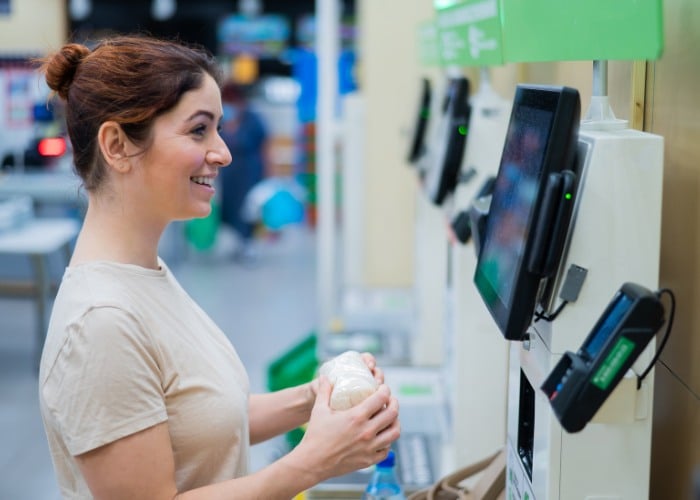Self-checkout systems have become ubiquitous in our lives: they’re everywhere, from retailer stores like Walmart, or Costco, to other stores like clothing or trinkets sellers. Many retailers have adopted them to minimize the risk of theft or shoplifting. However, self-checkout theft has become so common that it has given rise to a new vocabulary of techniques, such as the “banana trick,” “the pass around,” and “the switcheroo,” (we’ve talked about those illegal tricks) that shoppers use to game the system. In a survey conducted by Voucher Codes Pro, 20% of the 2,634 respondents admitted to stealing at self-checkouts, and over half of those respondents said that detection by store security was unlikely.
To counter this increasing problem, retailers are investing in new technologies. Yeah, more technology to stop the issue created by new technology. Sound legit. For example, they’ve implemented advanced cameras that can detect underhanded behavior at the self-checkout kiosks. Walmart has invested in a system called “Missed Scan Detection,” which deploys advanced cameras to prevent shoplifting at checkouts. However, according to some Walmart employees, the system has misidentified innocent behavior as theft and has failed to stop actual instances of stealing.
This Is How Self-Checkout Errors Could Affect Your Financial Reputation
What is more, the risk of false positives is also a concern. A false accusation of shoplifting could be devastating, depending on one’s position. Self-checkouts have inherent risks that can lead to false accusations. Customers are not employees and may overlook items while scanning their purchases, change the price themselves, or alter the weight of an item. Self-checkouts can also improperly report a customer as stealing an item when they did not. While self-checkout systems aim to speed up the process, they can sometimes slow everything down and cause frivolous situations that could have been avoided by using a cashier instead.

Despite these concerns, retailers continue to invest in new technology to combat self-checkout theft. Walmart has equipped its employees with a handheld scanner to scan customer purchases and detect any missed items. However, the use of new technology to combat self-checkout theft also risks false accusations and wrongful convictions. Experts in artificial intelligence agree with skillful people in the retailer world, companies need to consider both the benefits and risks of self-checkouts and take appropriate measures to ensure that they protect both their businesses and their customers’ financial reputations.
The “Banana Trick” Survives the Self-Checkout Security Improvements
As we’ve written before in some other articles, the “banana trick” is a method of shoplifting where a customer weighs an item that is cheaper than the actual item they are purchasing. They do this by scanning the barcode of a cheaper item, such as a banana (hence the name of the cheat), and then placing the more expensive item on the scale.
The scale will read the weight of the more expensive item, but the barcode will be of the cheaper item, resulting in the customer paying less than they should.